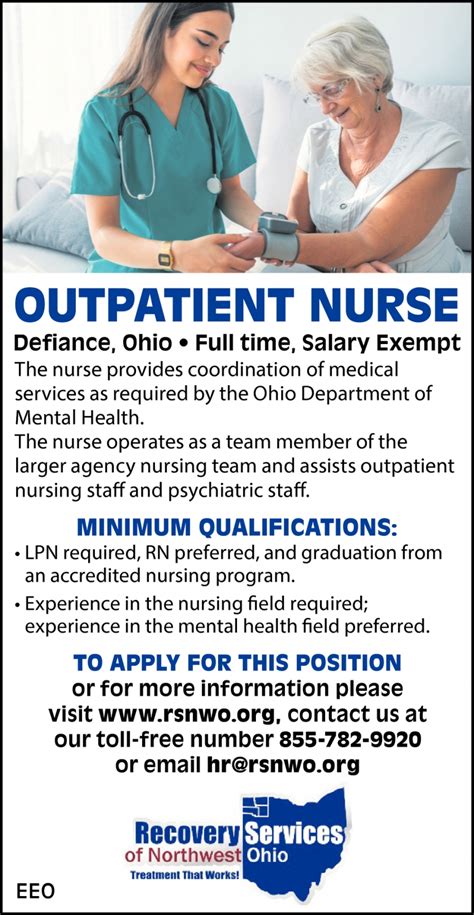Intro
Discover flexible and rewarding outpatient nursing jobs for nurses, from clinics to community health. Explore 10 in-demand roles, including nurse practitioners, case managers, and telehealth nurses, that offer work-life balance and opportunities for professional growth in various healthcare settings.
Nursing is a rewarding and challenging profession that offers numerous career opportunities across various settings. While many nurses choose to work in hospitals, others prefer the flexibility and autonomy of outpatient nursing jobs. Outpatient nursing roles involve providing care to patients outside of a hospital setting, often in clinics, physician offices, or community health organizations. If you're a nurse looking to transition into an outpatient role or simply want to explore your options, here are 10 outpatient nursing jobs to consider:

1. Clinic Nurse
Clinic nurses work in outpatient clinics, providing primary and specialty care to patients. Their responsibilities may include conducting health assessments, administering medications, and educating patients on disease management and prevention. Clinic nurses often work in fast-paced environments, prioritizing patients and managing multiple tasks simultaneously.
Key Responsibilities:
- Conduct health assessments and develop care plans
- Administer medications and treatments
- Educate patients on disease management and prevention
- Collaborate with healthcare teams to coordinate care
2. Physician Office Nurse
Physician office nurses work in medical offices, supporting physicians and other healthcare professionals in providing patient care. Their duties may include taking vital signs, preparing patients for exams, and assisting with procedures. Physician office nurses often serve as a liaison between patients and healthcare providers, addressing concerns and providing education.

Key Responsibilities:
- Take vital signs and prepare patients for exams
- Assist with procedures and treatments
- Educate patients on medications and treatment plans
- Coordinate care with healthcare teams
3. Telehealth Nurse
Telehealth nurses provide patient care remotely, using technology such as video conferencing and phone calls. They assess patients' health needs, develop care plans, and educate patients on disease management and prevention. Telehealth nurses often work in call centers or from home, providing flexible scheduling and work-life balance.
Key Responsibilities:
- Conduct health assessments and develop care plans
- Educate patients on disease management and prevention
- Coordinate care with healthcare teams
- Document patient interactions and care plans
4. Occupational Health Nurse
Occupational health nurses work with employers to promote workplace health and safety. They conduct health assessments, develop wellness programs, and provide education on injury prevention and management. Occupational health nurses often work in industry settings, such as manufacturing or construction.

Key Responsibilities:
- Conduct health assessments and develop wellness programs
- Educate employees on injury prevention and management
- Coordinate care with healthcare teams
- Develop and implement workplace health and safety policies
5. Home Health Nurse
Home health nurses provide care to patients in their homes, often following hospital discharge or surgery. They conduct health assessments, develop care plans, and educate patients on disease management and prevention. Home health nurses often work independently, using their critical thinking and problem-solving skills to provide high-quality care.
Key Responsibilities:
- Conduct health assessments and develop care plans
- Educate patients on disease management and prevention
- Coordinate care with healthcare teams
- Document patient interactions and care plans
6. Case Management Nurse
Case management nurses coordinate patient care across healthcare settings, ensuring seamless transitions and effective communication. They develop care plans, educate patients on disease management and prevention, and collaborate with healthcare teams to optimize patient outcomes.

Key Responsibilities:
- Develop care plans and coordinate patient care
- Educate patients on disease management and prevention
- Collaborate with healthcare teams to optimize patient outcomes
- Document patient interactions and care plans
7. School Nurse
School nurses provide health services to students, staff, and faculty in educational settings. They conduct health assessments, develop care plans, and educate students on disease management and prevention. School nurses often work in fast-paced environments, prioritizing students and managing multiple tasks simultaneously.
Key Responsibilities:
- Conduct health assessments and develop care plans
- Educate students on disease management and prevention
- Collaborate with educators and healthcare teams to optimize student outcomes
- Document student interactions and care plans
8. Travel Nurse
Travel nurses work temporary assignments in various healthcare settings, often filling staffing gaps or covering peak demand periods. They conduct health assessments, develop care plans, and educate patients on disease management and prevention. Travel nurses often work in new and challenging environments, using their adaptability and flexibility to provide high-quality care.

Key Responsibilities:
- Conduct health assessments and develop care plans
- Educate patients on disease management and prevention
- Collaborate with healthcare teams to optimize patient outcomes
- Document patient interactions and care plans
9. Public Health Nurse
Public health nurses work in community settings, promoting health and preventing disease through education, outreach, and advocacy. They develop programs and policies, collaborate with community partners, and educate the public on health topics. Public health nurses often work in government agencies, non-profits, or private organizations.
Key Responsibilities:
- Develop programs and policies to promote health and prevent disease
- Collaborate with community partners to optimize health outcomes
- Educate the public on health topics
- Document program outcomes and evaluate effectiveness
10. Research Nurse
Research nurses work in academic, industry, or government settings, conducting studies and collecting data to advance healthcare knowledge. They develop research protocols, recruit participants, and collect and analyze data. Research nurses often work in collaborative environments, using their critical thinking and problem-solving skills to contribute to healthcare innovation.

Key Responsibilities:
- Develop research protocols and recruit participants
- Collect and analyze data
- Collaborate with researchers and healthcare teams to optimize study outcomes
- Document study findings and contribute to healthcare innovation
In conclusion, outpatient nursing jobs offer a wide range of opportunities for nurses to provide high-quality care in various settings. Whether you're interested in working in clinics, physician offices, or community health organizations, there's an outpatient nursing job that aligns with your skills, interests, and career goals. Consider exploring these options and finding the perfect fit for you.
What are some benefits of working in outpatient nursing jobs?
+Outpatient nursing jobs offer flexible scheduling, autonomy, and opportunities for professional growth and development. They also provide a chance to work in various settings and with diverse patient populations, which can be rewarding and challenging.
What skills are required for outpatient nursing jobs?
+Outpatient nursing jobs require strong communication, critical thinking, and problem-solving skills. Nurses should also be able to work independently, prioritize tasks, and manage multiple responsibilities simultaneously.
How can I transition into an outpatient nursing job?
+To transition into an outpatient nursing job, consider gaining experience in a hospital or clinical setting, developing your skills and knowledge, and networking with professionals in your desired field. You can also explore job openings and apply to positions that align with your career goals.
